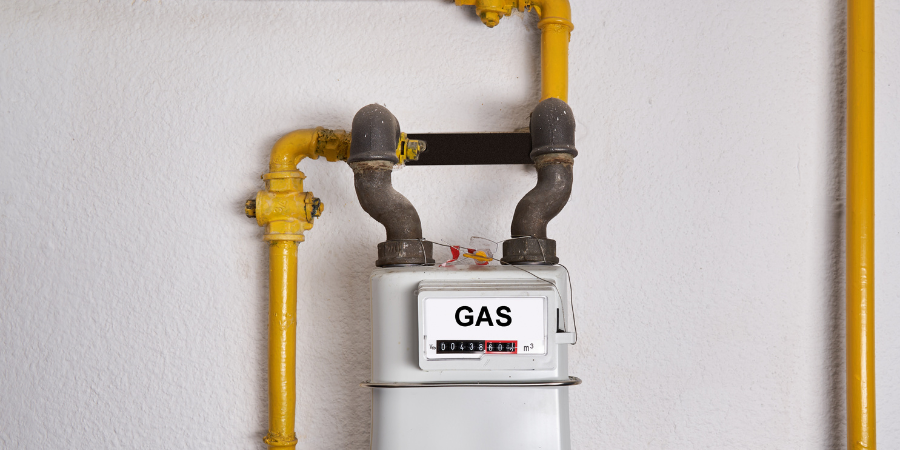Natural gas is an abundantly available source of power used by many homes and businesses for heating, cooling, cooking, bathing, and a multitude of other activities. In this article, we will learn about where the gas comes from, how it reaches your home or business, and the safety concerns commonly associated with it. We will also discuss steps that can be taken to prevent a gas leak disaster so you can live with the peace of mind all persons should enjoy.
Origin of Natural Gas
Natural gas primarily consists of methane, a hydrocarbon gas formed from the decomposed remains of plants and animals that existed millions of years ago. These organic materials are buried under sediment layers where high pressure and temperatures transform them into oil and natural gas. Natural gas is found beneath large rock formations, and the first step in gathering the gas is to locate potential reserves through geological surveys. Once a viable source is found, production wells are drilled, allowing the gas to naturally flow to the surface. This involves sophisticated technology and equipment to ensure the efficient and safe extraction of gas.
Transportation of Natural Gas
After extraction, natural gas undergoes processing to remove impurities and byproducts like water vapor, sulfur, and carbon dioxide, making it safe for household use. The processed natural gas is then transported through a vast network of pipelines. These pipelines are the most common method of transporting natural gas due to their efficiency and lower environmental impact compared to other transportation methods.
The main pipelines, known as transmission pipelines, carry natural gas across long distances to distribution centers. Smaller distribution pipelines take over from these centers, delivering the gas to residential areas and then through service lines that connect individual homes and commercial sites to the local distribution network.
Compressed natural gas (CNG) or liquefied natural gas (LNG) are alternatives for those living in rural areas not yet served by pipelines. These forms are transported in tanks or containers by road, rail, or sea to local storage facilities, where they are then distributed to homes via local networks.
Safety Concerns
Natural gas is a safe and efficient power source and is more eco-friendly than other power sources as it produces fewer greenhouse gases. However, natural gas is flammable, and a leaking gas line can lead to fires, poisoning, and explosions, so caution must be taken. Here, we will discuss the dangers of a leak and the signs that a gas leak is present.
Carbon Monoxide Poisoning
When gas is not burning properly, it produces a harmful gas known as carbon monoxide. Unfortunately, carbon monoxide is odorless, so it is not easily detectable. Some of the physical symptoms of breathing in this byproduct are headaches, chest pains, a reduction in appetite, and fatigue. Carbon monoxide reduces the amount of oxygen in the air, leading to asphyxiation. Watch for unexplained deterioration of healthy houseplants, which also require adequate amounts of oxygen.
Fire And Explosions
Even a small gas leak is dangerous. If it occurs near a fire source, such as a fireplace, or an electric shock is provided, it can ignite and cause a fire or, worse, an explosion. Unfortunately, once a fire starts, there is no time for inhabitants to flee from the building, and death is likely.
Signs Of A Gas Leak
Anyone using natural gas must know the signs of a possible leak, as time is of the essence. Here, we will discuss some signs of a leak to prevent you from experiencing the dangers of a leak.
Smells
Although natural gas is odorless, utility companies understand the urgency of detecting a gas leak. To help detect a leak quickly, they add mercaptan to the gas to create an easily recognizable rotten egg smell.
Sounds
If you should hear a hissing or whistling sound near the gas line it is a clear sign of a leak. Immediately evacuate the property and call for help!
Bubbles
In the yard, you may notice a puddle of water bubbling as the gas escapes the underground segment of the gas line. Again, if the bubbling is accompanied by a gas odor, get help immediately.
Higher Than Normal Gas Bill
Unless you can justify a higher bill because perhaps you were running your gas-powered pool heater all weekend, a rise in your gas bill may be an indication of a leak.
Protecting Yourself from Gas Leaks
Natural gas leaks, while rare, can be dangerous and pose health risks. As a plumber, I always emphasize the importance of preventative measures and awareness to ensure safety. Here are some key strategies:
Regular Maintenance
Be certain to have all gas appliances and connections inspected annually by a qualified professional. This includes checking appliances like stoves, heating systems, and water heaters to ensure they are in good working condition and properly vented.
Install Gas Detectors
Gas detectors to identify the presence of carbon monoxide can provide an early warning of a leak, allowing for swift action. These should be installed near gas appliances and in every bedroom of your home.
Immediate Response
If you suspect a gas leak, do not use electrical devices or open flames, as these can ignite the gas. Leave the area immediately and call 911 and your gas utility company from a safe distance. They will send professionals to handle the situation.
Proper Ventilation
It is important to provide adequate airflow in areas surrounding gas appliances. This means keeping the area around your HVAC equipment and your water heater free of boxes and other stored items. This will ensure adequate ventilation and prevent the buildup of gas should there be a slow and undetected leak.
Educate Your Family
Make sure all household members know how to shut off the gas supply in case of an emergency. Educate them about the signs of a leak and the importance of evacuating the area if they suspect one. Often, people are reluctant to flee and call for help out of fear of being wrong. It is far better to suffer some imagined embarrassment than the fatal consequences of a leak ignored.
Looking For Installation, Repair, Replacement, Or Maintenance Of Your Natural Gas Line?
Natural gas is a valuable resource that powers many aspects of our daily lives, from heating our homes to cooking our meals. However, it is crucial to understand its origins, how it reaches our homes, and the measures needed to use it safely. By adhering to the safety tips outlined above and regularly maintaining your gas appliances and connections, you can significantly mitigate the risks associated with natural gas. Remember, the best approach to dealing with gas leaks is prevention through vigilance and regular professional checks. Call us so we can ensure your gas line is safe!






